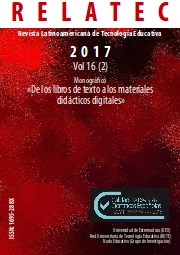Textbooks and digital resources: current transformations in France
DOI:
https://doi.org/10.17398/1695-288X.16.2.143Keywords:
Educational Technologies, Portals, Resources, Textbook, TeachersAbstract
Abstract: Many discourses emphasize the great educational potential of digital technologies. These technologies can renew both the activities carried out with students, the management of their learning paths, working methods, etc. In theory, this will be beneficial for education. But the evolution of these technologies in the field of education does not necessarily lead to idyllic results. In reality, the changes observed in these areas are slow and are based on very localized, rarely convergent, and often incomplete. Several elements are likely to determine the uses of computer technologies: the strategies of publishers and links with «EdTech» companies; political choices (in terms of curricula, equipment, examinations, etc.); materials (tablets, smartphones, etc.); educational resources, their modes of production and exchange, the place of free educational resources; changes in national and European legislation about digital matters. In this paper, we will try to show how the French publishing landscape and access to educational resources is currently undergoing important changes, starting from a configuration where textbooks are central to sketch out the current situation, where the supply of online digital resources seems to open up alternatives. We will rely in particular on the case of a portal of resources financed by the Ministry of National Education and published by consortia bringing together publishers and EdTech structures.
Downloads
References
Baron, G.-L., Bruillard, É. et Lévy, J.-Fr. (2000). Les technologies dans la classe : de l’innovation à l’intégration. Epi / INRP. https://halshs.archives-ouvertes.fr/edutice-00000898/document
Baron, G.-L. et Zablot, S. (2017). De la constitution de ressources personnelles à la création de communautés formelles : étude de cas en France. Review of Science, Mathematics and ICT Education, 11(2): 27-45.
Bréda, I., Combès, Y. et Petit, L.. (2012). L’éducation à l’information dans le milieu scolaire révélatrice des enjeux relatifs au changement de paradigme éducatif ? Études de communication. langages, information, médiations, no 38 (2012): 117‑30. https://doi.org/10.4000/edc.3406.
Bruillard, É. (2005). Les manuels scolaires questionnés par la recherche. In Manuels scolaires, regards croisés, 13‑36. Documents, actes et rapports pour l’éducation. Caen: CRDP de Basse-Normandie.
Choppin, A. (1992). Les manuels scolaires : histoire et actualité. Pédagogies pour demain. Paris: Hachette éducation.
Choppin, A. (2005). L’édition scolaire française et ses contraintes : une perspective historique. In É. Bruillard (éd.), Manuels scolaires : regards croisés, 39‑53. Caen: SCEREN-CRDP Basse-Normandie.
Choppin, A. (2008). Le manuel scolaire, une fausse évidence historique. Histoire de l’éducation, no117 (2008): 7‑56. https://doi.org/10.4000/histoire-education.565
Deceuninck, J.. (2012). Les outils éducatifs à l’école : du manuel au réseau. Questions contemporaines. Série Les Industries de la culture et de la communication. Paris: L’Harmattan.
Durpaire, J.-L. (2010). Contribution du groupe EVS à l’étude sur le manuel scolaire à l’heure du numérique. Place du manuel scolaire dans les politiques documentaires des établissements scolaires à l’heure du numérique. Inspection générale de l’Éducation nationale, 7 janvier 2010 : https://espaceeducatif.ac-rennes.fr/jahia/webdav/site/espaceeducatif3/groups/DOCUMENTATION_Webmestres/public/fichiers/Manuelscolaire-groupe%20EVS-01-10.doc
Fluckiger, C., Bachy, S. et Daunay, B.. (2014). Les enseignants face aux ressources numériques. Une recherche didactique. In Journées Communication et Apprentissage Instrumentés en Réseau (JOCAIR). http://hal.univ-lille3.fr/hal-01379365
Jeanneret, Y. (2014). Critique de la trivialité : les médiations de la communication, enjeu de pouvoir. Collection SIC 4. Paris: Non standard.
Khaneboubi, M., Roux-Goupille, C., Maitre, J.-Ph. et Le Hénaff, C. 2017). Étude qualitative sur l'emploi de photocopies par des enseignants de Lycée, Projet ReVEA, research report 2.3, 2017. https://www.anr-revea.fr/
Miège, B. (2012). La théorie des industries culturelles (et informationnelles), composante des SIC. Revue française des sciences de l’information et de la communication, no 1 (2012). http://rfsic.revues.org/80
Ministère de l’Éducation nationale. (2011). Vademecum du gestionnaire en EPLE. École supérieure de l’éducation nationale. http://cache.media.education.gouv.fr/file/publications/21/2/vademecum_gestionnaire_EPLE_version2011_189212.pdf
Mœglin, P. (2007). Le professeur et le courtier. Études de communication 2 (2007): 111‑32. http://edc.revues.org/588
Moreau, Fr et Peltier, S. (2015). Fondamentaux et mutations du secteur de l’édition : les ressorts de l’économie de la création. Syndicat national de l’édition, 2015. http://www.sne.fr/wp-content/uploads/2015/09/Les-ressorts-de-l%C3%A9conomie-de-la-cr%C3%A9ation.pdf
ReVEA. (2015). État des lieux des systèmes de ressources. Profils de professeurs individuels et profils de collectifs dans les établissements. Research report 3.1, 2015. https://www.anr-revea.fr/
Syndicat national de l'édition. (2017). “Repères statistiques France et international 2016-2017". http://www.youscribe.com/BookReader/Index/2844716?documentId=3086999
Downloads
Published
Issue
Section
License
Authors who publish in this journal accept the following conditions:
1. The Author retains copyright in the article. Upon acceptance of the article, the author shall grant to the Publisher the right of first publication of the article. with the dcoument registered with the Creative Commons Attribution-NonCommercial-NoDerivative 4.0 International (CC BY-NC-ND) license, which allows to third parties to use what is published whenever they mention the authorship of the work and the first publication in this journal.
2. Authors can make other independent and additional contractual agreements for the non-exclusive distribution of the article published in this journal (eg, include it in an institutional repository or publish it in a book) provided they clearly indicate that the work was published for the first time in this journal.
3. Authors are allowed and recommended to publish their work on the Internet (for example on institutional or personal pages) before and during the review and publication process, as it can lead to productive exchanges and a greater and faster diffusion of published work (see The Effect of Open Access).









